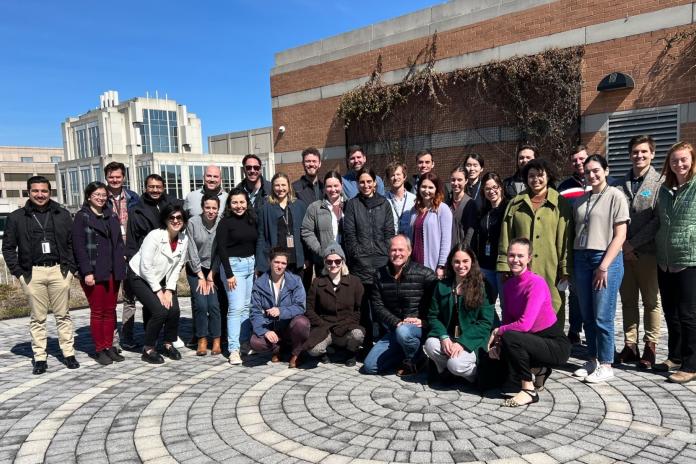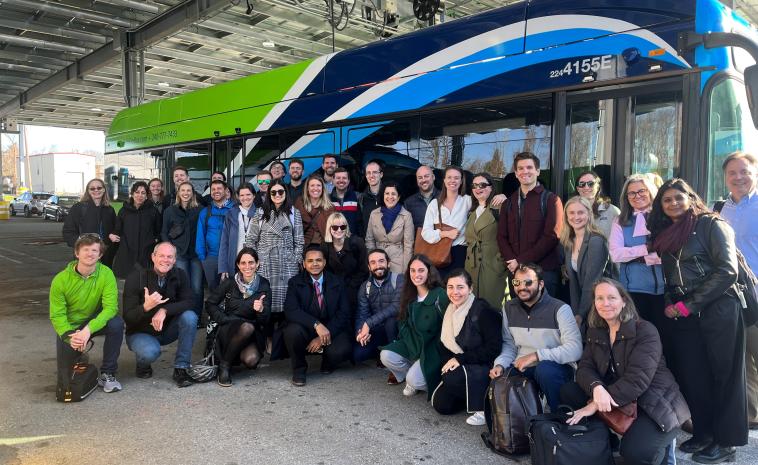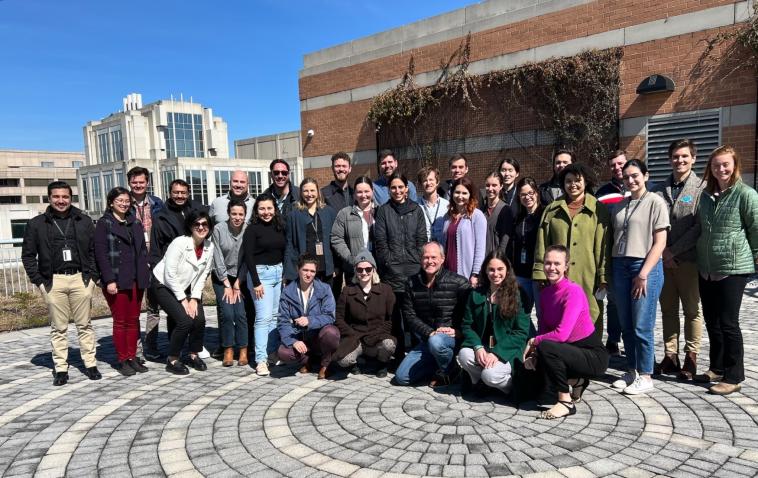About World Resources Institute’s Electric School Bus Initiative
Collaborating to equitably electrify the U.S. school bus fleet.

Our mission
In collaboration with partners and communities, WRI’s Electric School Bus Initiative aims to build unstoppable momentum toward an equitable transition of the entire U.S. school bus fleet to electric, bringing health, climate and economic benefits to children and families across the country and normalizing electric mobility for an entire generation.
Our history
In partnership with the Bezos Earth Fund, World Resources Institute established the Electric School Bus Initiative in late 2020 with the goal of building unstoppable momentum toward electrifying the full U.S. school bus fleet. This project builds upon and leverages WRI’s experience partnering with cities around the world to advance sustainable transportation systems, including extensive engagements focused on transit electrification and working to advance clean power options.
Our establishing partner: Bezos Earth Fund
The Electric School Bus Initiative was established in partnership with Bezos Earth Fund.
Our work
Together with partners, WRI's Electric School Bus Initiative is working in six areas of focus, whereby we:
Support school districts in accelerating the equitable transition to electric school buses.
We are partnering with school districts and school transportation providers to get more electric school buses on the road in more districts nationwide. We’re developing guides, planning documents, tools and resources to help any district begin or continue its electrification journey, and we’re supporting individual school districts with technical assistance — with a focus on low-income communities, communities of color, Tribal/Indigenous communities and those disproportionately impacted by diesel exhaust pollution. With record levels of electric school bus investments on the way, we’re also helping school districts access federal, state and utility funds, prioritizing historically underserved districts.
Collaborate with manufacturers across the electric school bus supply chain in preparing for an equitable and sustainable transition.
We are engaging manufacturing supply chain stakeholders to identify industry bottlenecks and increase electric school bus capacity and availability. We’re collaborating with manufacturers, suppliers, partner organizations, community colleges and other stakeholders to foster an equitable transition from fossil fuels to electric school buses with a focus on workforce preparation. This work is in part informed by our Manufacturing & Supply Chain Steering Committee.
Work with electric utilities to improve interconnection and investments for electric school bus charging infrastructure, including supportive rates and tariffs.
We are bringing together electric utilities, policymakers, school districts and private fleet operators to identify and advance equity-oriented electric system solutions. This includes innovative opportunities in managed charging, vehicle-to-grid (V2G) and vehicle-to-anything (V2X) technologies designed to improve grid reliability and resiliency, provide mobile power during disasters and advance renewable energy integration.
Facilitate understanding of electric school bus business models and promote the expansion of funding and finance options in the electric school bus market.
We’re building a clearinghouse of funding and financing opportunities to improve information access, developing a framework that can be used to understand new business models, and providing a total cost of ownership calculator so districts and other stakeholders can weigh economic considerations.
Engage policymakers at the federal, state and municipal levels to reduce barriers to equitable school bus electrification.
We’re helping communities make their voices heard and advocating for solutions that drive an equity-first transition to electric school buses. This includes work to usher in policy solutions, funding and financing options.
Center communities in pursuing school bus electrification and work with community-focused organizations to help provide the tools and resources to make it happen.
We are working collaboratively with community-based organizations — many of whom have been leading in the electric school bus space for years — to bring about an equitable transition to electric school buses. We're working to center the voices of community members in every school district.
The ESB Initiative is collaborating with school districts, advocacy organizations, electric utilities, manufacturers, financing entities and policymakers across the U.S. to accelerate an equitable transition to electric school buses.
As of June 2025, WRI's Electric School Bus Initiative is providing its highest level of tailored technical assistance in 10 states: California, Georgia, Maryland, Massachusetts, Michigan, Nevada, New Jersey, New York, North Carolina and Pennsylvania. The ESB Initiative has also identified priority states for dedicated advocacy and policy outreach: Georgia, Massachusetts, New York, North Carolina, Oregon, South Carolina and Pennsylvania. The ESB Initiative has also identified priority states for dedicated advocacy and policy outreach: California, Massachusetts, New York, North Carolina and Pennsylvania. We continue to work in additional states through partnership with other stakeholders as well.
Our resources
In addition to direct engagement, the ESB Initiative develops a wide range of free public resources to help facilitate an equitable transition to electric school buses. Find everything you need, including resources developed by others in the electric school bus space, all in one spot at the Electric School Bus Initiative Resource Library. With more than 200 searchable resources, it's your single stop for tools, information and more!
Our values
We envision a future in which all people — starting with members of communities that have been historically marginalized — enjoy the health, environmental and economic benefits of electric mobility. This work is driven by seven core values:
Equity
We will lead with equity while centering intersectionality. We recognize how past and current systems of structural racism and discrimination result in environmental injustices and the marginalization of people with disabilities and low-income, Black, Tribal, Indigenous and communities of color throughout the U.S. We recognize that we have an opportunity and a responsibility to mitigate these injustices. Therefore, by working with our partners and stakeholders, we will increase access to electric school buses for communities that have been historically marginalized. We will do so by centering equity in our processes, procedures and distribution of resources.
Integrity
We will be transparent in our work with our partners and stakeholders. We will utilize monitoring, evaluation and learning feedback loops to create a culture of accountability and ensure our processes and outcomes do not perpetuate injustices to historically underserved communities.
Innovation
We will incorporate new ideas, creative thinking and technologies to engage with our partners in an inclusive and equitable manner and co-create solutions for the transition of the U.S. school bus fleet to electric.
Urgency
We will prioritize solutions that address the fact that underserved and environmental justice communities have waited too long for the implementation of solutions that address their needs, concerns, and historic exclusion from the economic opportunity and benefits of sustainable transport.
Independence
We will utilize a data driven approach to create momentum that does not sacrifice equity, while remaining uncompromised by external pressures, including partisan politics, institutional or personal allegiances, or sources of financial support.
Respect
As we humbly enter into this project, we acknowledge the many years of work of other organizations leading the way and aim to collaboratively build on that work in the effort to address the equity implications of school bus mobility at the federal, state and community levels. We will support the development of transparent and inclusive decision-making processes in which the voices, experiences and needs of community-based stakeholders are valued.
Trust
We will continue to safeguard the trust of our partners, stakeholders and the public by being fair, just and transparent in our decision-making, and mindful in our relationships and communications.
Our equity principles
In collaboration with members of its Advisory Council, WRI's Electric School Bus Initiative created the following equity principles to support the project's commitment to centering equity throughout its activities and objectives:
- Address historical and structural injustices
- Build trust and listen, learn and adapt
- Be transparent, accountable and collaborative
- Prioritize people over vehicles, profit, property or placemaking
Our networks
WRI’s Electric School Bus Initiative is facilitating networks, working groups and steering committees for stakeholders across the nation. These networks include our Utility Working Group, our Manufacturing & Supply Chain Steering Committee, national and California-focused forums hosted by our partner CALSTART, and our Electric School Bus Ambassadors program. To learn more about these some of these networks, click here.
Our Advisory Council
The Electric School Bus Initiative Advisory Council plays a key role in guiding the Initiative toward the goal of equitably electrifying the full fleet of U.S. school buses.
Comprised of leading figures in fields including nonprofit advocacy, education, public policy, utility management, environmental justice and electrification, the Advisory Council provides invaluable insights and perspectives on priorities across the Initiative.
Our partners
The Electric School Bus Initiative is proud to partner with environmental, equity and research organizations helping to advance an equitable and rapid transition to electric school buses nationwide. One of our goals is to ensure the voices of communities that have been historically underrepresented are included and prioritized in the transition to electric school buses. Therefore, we prioritize partnerships and engagement with equity-oriented organizations.
Work with us
From contracting opportunities to job postings, find ways to get involved in the equitable transition to electric school buses at the professional level.
Our staff
Image

| Image

|
Staff working on the Electric School Bus Initiative include:
Project Leadership & Advisors
- Sue Gander, Director, Electric School Bus Initiative
- Carla Walker, US Director, Environmental Justice and Equity
- Christina DeConcini, Director, Government Affairs
- Lori Bird, Director, US Energy Program and Polsky Chair for Renewable Energy
- Brittany Barrett, Deputy Director, Implementation & Operations
- Katherine Roboff, Deputy Director, External Affairs
School District Support & Research
- Vishant Kothari, Senior Manager, School Bus Electrification and Battery Circularity
- Hannah Harasaki, Project Manager, Connective Mobility
- Jessica Wang, Manager, Technical Assistance
- Jackie Lombardi, Manager, Technical Assistance
Manufacturing & Workforce Development
- Stephanie Ly, Senior Manager, eMobility Strategy and Manufacturing Engagement
- Emmett Werthmann, Research & Engagement Associate
- Vishant Kothari, Senior Manager, School Bus Electrification and Battery Circularity
Electric Utilities & Financial Solutions
- Greggory Kresge, Senior Manager, Utility Engagement and Transportation Electrification
- Alyssa Curran, E-Mobility Financial Solutions and Equity Research Associate
- Michelle Levinson, Senior Manager, eMobility Finance & Policy
- Robert Stafford, Research Associate, Transportation Electrification and Grid Resiliency
Public Policy
- Ben Hayman, Senior Manager of State and Local Policy for Transportation Electrification
- Meredith Epstein, Manager of Federal Policy for Electric Transportation
- Alice Kwak, Policy Research Analyst
Communications & Engagement
- Katherine Roboff, Deputy Director, External Affairs
- Joe Versen, Communications & Engagement Specialist
- Tom Meyer, Senior Communications Manager
- Jacqueline Kantor, Communications Associate
Equity
- Carla Walker, US Director, Environmental Justice and Equity
- Alyssa Curran, E-Mobility Financial Solutions and Equity Research Associate
- Sophie Young, Manager, Environmental Justice and Equity
Measurement, Evaluation, Learning, Research & Operations
- Amy Todd, Monitoring, Evaluation, Learning and Research Lead
- Brian Zepka, Research Manager
- DJ Gross, Project Manager
- Jakob Frederick Harteis, Grants & Finance Specialist
- Kate Archambault, Operations Manager